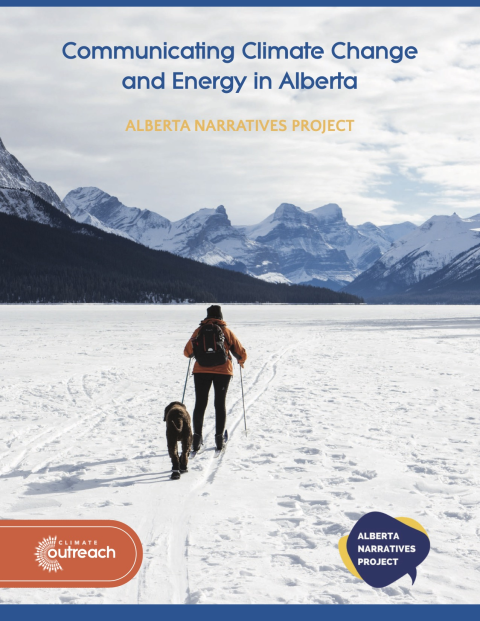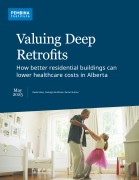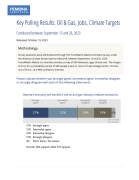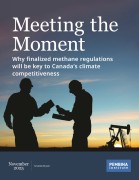Alberta Narratives Project
The Alberta Narratives Project was a community-based initiative convened by the Alberta Ecotrust Foundation and Pembina Institute to seek ways of talking about climate and energy that reflect the shared values and identities of Albertans and to provide a more open and constructive basis for conversation.
Seventy-five organizations hosted 55 Narrative Workshops around Alberta, making this one of the largest public engagements of its kind. They spoke with a broad spectrum of people including farmers, oil sands workers, energy leaders, business leaders, youth, environmentalists, New Canadians and many more.
These reports outline the core narratives that emerged from the project conversations.
Why we need a new conversation about energy and climate change in Alberta
Few issues facing Canada are as nationally divisive as climate change and the future of energy. Although the majority of Canadians as a whole favor strong action on climate change and a transition to renewable energy, there are wide variations in attitudes between provinces, across age groups and with people of different political values. Within this fractured national picture, polls reveal Alberta to be the most polarized province; showing that Albertans are split down the middle between those who are concerned about climate change and those who are dismissive as to whether changes in climate are natural or human-caused.
There are marked differences in opinion between different occupation groups, different parts of the province and, especially between people holding different political values. These divisions make it increasingly difficult for Albertans to discuss climate change and energy with each other, to conduct a civil debate around options for the future, or to form a coherent and sustained vision of the future.
The Alberta Narratives Project (ANP) seeks to address this challenge and identify new and more constructive ways for people in Alberta to talk about these pressing issues. In particular, it seeks to replace a combative and acrimonious debate with a constructive conversation based on shared values and respect for people’s different ways of seeing the world.
We have looked for the language that reduces polarization. Effective language needs to resonate well with the two-thirds of Albertans who hold the middle-ground position that climate change is real, but not a major threat. Effective language also needs to avoid angering, alienating or insulting people who already hold strong views on climate change and energy and are unlikely to shift their views.
In conducting this work, Climate Outreach and partners, Alberta Ecotrust Foundation and Pembina Institute, have listened carefully to what people said while looking for common ground and new ways of talking. Climate Outreach’s role has been as a facilitator of a constructive and respectful conversation not as advocates or educators. We have openly accepted the scientific evidence that climate change is real, serious, and is caused by human activities – including the burning of fossil fuels. Beyond this, though, we have been careful not to assert any policy agenda; leaving people to choose their responses for policy, lifestyles, and the economy. This research offers a roadmap for holding a productive conversation but does not favour one particular end destination. For example, we explored the ways that people think and talk about the future of the oil industry and renewable energy, but did not promote any specific pathway for either.
Outcomes
The Alberta Narratives Project has three major outcomes:
1. It is clear there is a need, and a demand, for a different kind of participatory conversation on climate change and energy in Alberta.
We held discussion groups between April and June 2018 — called Narrative Workshops — that provided nearly 500 people with the opportunity to come together and share their views among their peers. The groups represented a wide range of Albertan society from farmers to oil sands workers, to senior business people, youth groups and New Canadians.
For most of the participants, this was the first time that they had talked about these issues with people like themselves. Feedback clearly indicated that the participants enjoyed engaging in these conversations. In many cases, the discussions continued beyond the planned timing, some late into the night.
2. From these conversations we have identified language and approaches that are less divisive, speak to shared values and common ground, and could be the basis of a new and more constructive conversation.
We are confident that these findings are valid and robust. Our methodology is based on best-practice in social research. Our findings are supported by an extensive literature of existing Canadian communications research. The resulting project has become one of the largest “qualitative” climate change communications projects ever conducted. The speed with which this project has come together is remarkable and, we feel, a tribute to the Albertan entrepreneurial spirit and desire for a more constructive, balanced conversation.
3. Alberta now has an additional 87 trained communication researchers who understand the best ways of identifying effective narratives and engaging diverse audiences.
This significant capacity building leaves a legacy beyond learning new skills in good quality communications research — it also paves the way for a deeper, more considerate two-way approach in communicating climate change.
Results
The Project has produced two major reports:
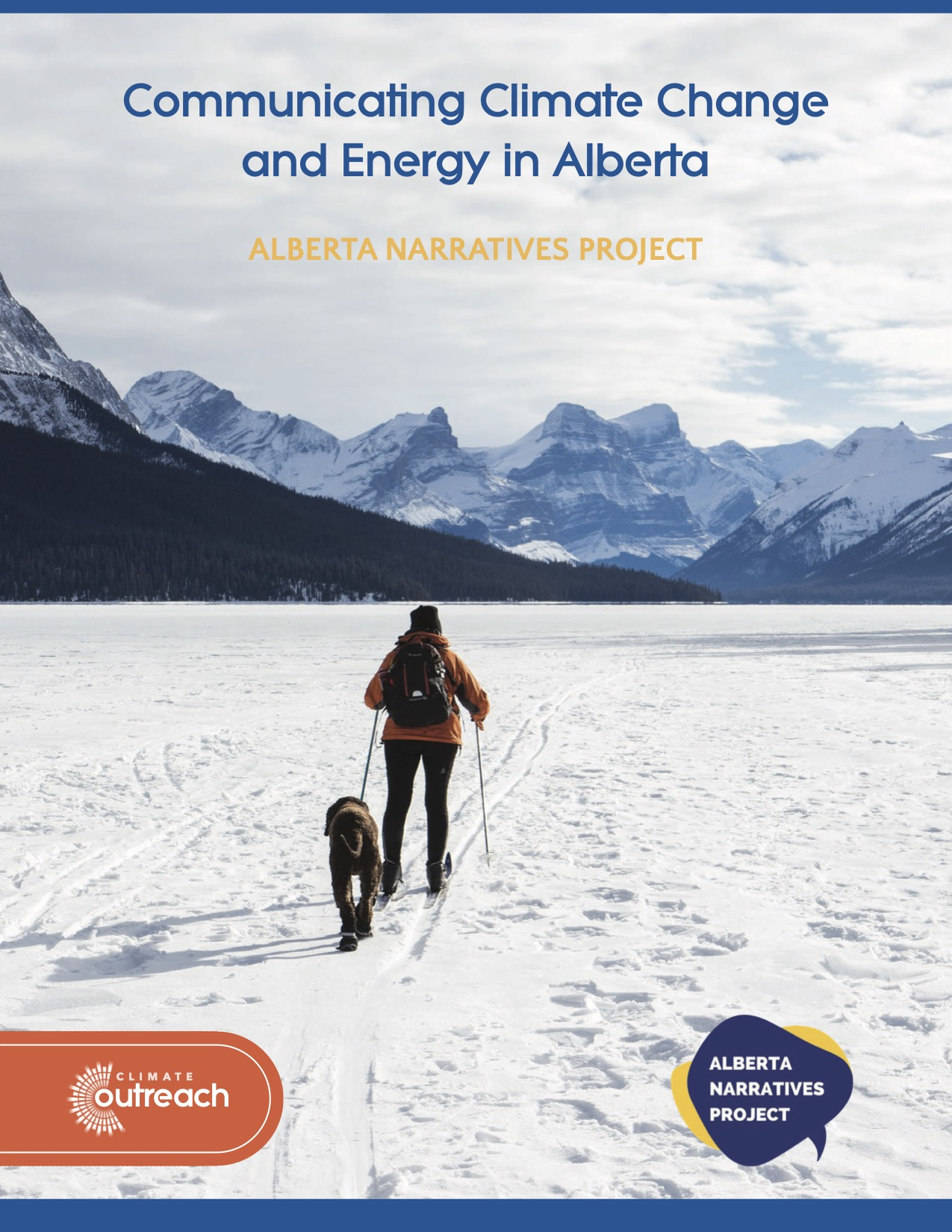 Communicating Climate Change and Energy in Alberta: Report I
Communicating Climate Change and Energy in Alberta: Report I
The first report identifies language that works best across a wide range of groups in Alberta and helps to find common ground between very different positions. This language generates a core narrative—what communicators call a “meta-narrative”—that can be employed to achieve general public engagement.
Also see:
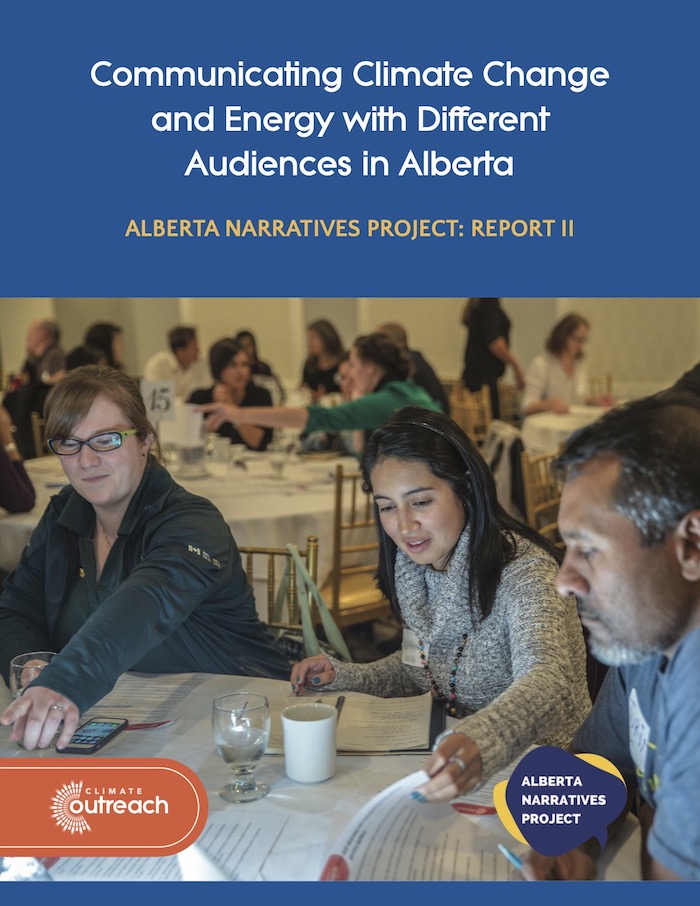 Communicating Climate Change and Energy with Different Audiences in Alberta: Report II
Communicating Climate Change and Energy with Different Audiences in Alberta: Report II
In this report we explore additional language that speaks to the values and identities of different audiences within Alberta. The report includes narratives tailored to each audience – what communicators call “sub-narratives”. The sub-narratives are intended to sit within the larger meta- narrative from Report I, giving the latter greater nuance and specific meaning.
Also see:
